Desert vs. Dessert
My week in Xinjiang has been a series of ups and downs. When I booked my flight, another couchsurfer had planned to join me for the trip, but financial difficulties resulting from a series of miscues--missed trains, forgotten passports, etc.--forced him to cancel on me. As much as possible, I tried to meet new people along the way, starting with a few Swiss Germans, two Belgians, a Frenchie, an American-Frenchie, two Japanese, a really obnoxious Canadian, two American frat boys, two British sisters who had never flown before, an English mother and son, and Germans with and without socks for their sandals. I have also been staying with Akbar, a friend of Tyler's in Xinjiang. The company was more than sufficient until yesterday, when the perfect Chinese storm synthesized from the volatile elements of transportation and tourism.
About a week ago, I flew from Chengdu to Urumqi, capital of Xinjiang Autonomous Region in China. Xinjiang and Sichuan, where Chengdu is located, were two of the places I most wanted to visit in 2006-2007, but I ran out of time and money. Luckily, all of my other plans fell through and flights to both were cheap this summer, so I suppose I now need to come up with some additional places worth exploring. Tibet would certainly make this list, but it's massively expensive with all of the rules and regulations of the Chinese government. Anyhow, I arrived in Urumqi, not known for much beyond being a transportation hub, and shared a cab with the Swiss Germans to the hostel, since all of my potential couchsurfing guests had fallen through, where I promptly met another Swiss German, with whom I went out for dinner and a beer. Xinjiang is an interesting place for a number of reasons, the least of which is its absurd time zone classification. The Chinese central government operates the entire country under one time zone, so in the West, which is more than 3000 miles from and closer to Kazakhstan and Pakistan than Beijing, the sun effectively rises at around 8:30am and sets around 9:30 or 10:00pm. Of course, the locals operate on their own time, two hours behind that of Beijing, but that just means that you always have to stipulate which time zone you're referring to--Beijing time or Xinjiang time. It gets pretty confusing if you're not paying attention, and it makes you second guess yourself whenever you set a time for something.
Returning from the tangent now, I decided to leave Urumqi after only one night for Turpan, because Turpan has a number of compelling reasons to visit, and because I didn't want to save that visit for later in the week, get trapped without transportation, and not be able to make it back for my return flight from Urumqi. So, the next day I took a bus to Turpan, which was regularly over 110 F during the day, and latched on to the first foreigners I saw, since I wanted to hire and share a car for the next day to visit some sights, and because I didn't want to be stuck eating dinner alone, since not too many foreigners make it this far north and west. My communication has been limited, especially in the heavily Uighur areas like Turpan, so chatting with the locals was less of an option. In this case, the Belgians and Frenchies were the lucky ones, and I made a decent effort in the Yahtzee that they had continued from their 24-hour train rides from the day before. The actual city of Turpan has little to do beyond its bazaar, which was more impressive for the people watching than for what was offered, so I rode a donkey cart into town to search unsuccessfully for a karaoke joint with the Brits and Frat Boys, before heading to bed.
Wind farms in the desert:
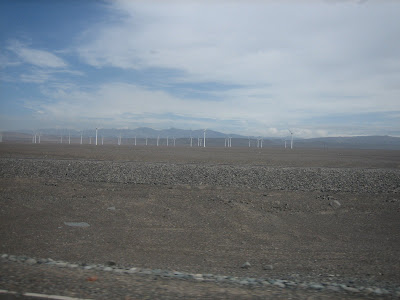
Common mode of transportation:

Mosque in the old part of town:
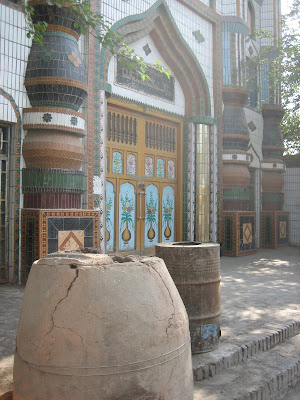
Another mosque:

These guys had a little accident when they took their eyes off the road to stare at the foreigners walking through town:

Donkey and Uighyrs:
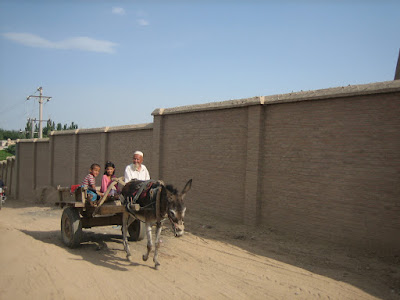
Emin Minaret in Turpan:
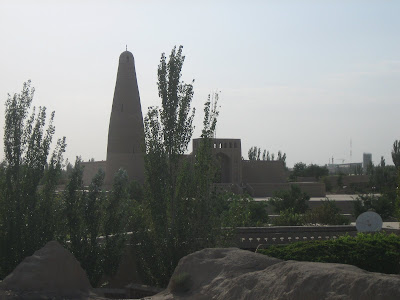
Our mode of transportation to look for a karaoke joint in Turpan (the structure behind the donkey is used for drying grapes):

My hotel (my dorm room was in the basement) in Turpan:

Watermelon alley at the bazaar:
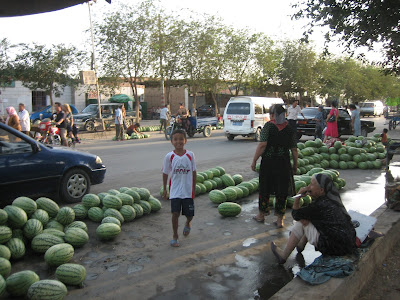
Our car departed the next morning at 7:30am, and we were luck to arrange with the driver which areas we wanted to visit. We intended to avoid what had been described as tourist traps by many guides and other travelers, but dedicate extra time to those places that really had something to offer. First on the itinerary was the village of Tuyoq, set in a valley beneath caves dating from 400 AD. This place was incredible, really an oasis in the hot desert; the cemetery on the edge of town that was at least 1000 years old was especially interesting. It is said that this is considered seen visits to Tuyoq equal one visit to Mecca, as this is the resting place of one of the Uighur forefathers, and also perhaps because virtually none of the Uighurs has the resources to make it to Mecca. We did have to argue for 20 minutes before we allowed to depart, though, since we decided to eat the ice cream that had been offered to us, despite our Strong resistance, rather than let it melt. Unfortunately, as the government has limited travel in the region and to the country as a whole this summer because of the Olympics, the town has seen an enormous drop in tourism, but the few people I chatted with did seem optimistic that order would return in time for next summer.
Tuyoq:
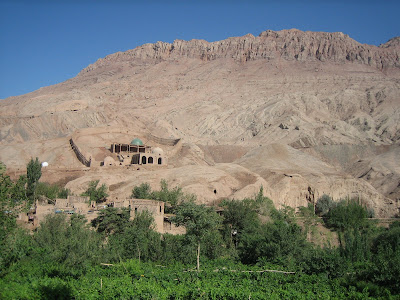


Watching over the melons:

Skinning a newly-killed goat:
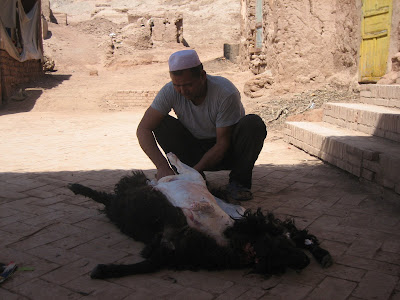
Chillin'-out, maxin', and relaxin' all cool:
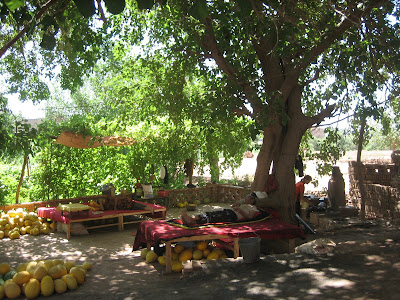
Damn it feels good to be a gangster. I know I look like a tool, but I thought some protection from the desert sun would be wise:
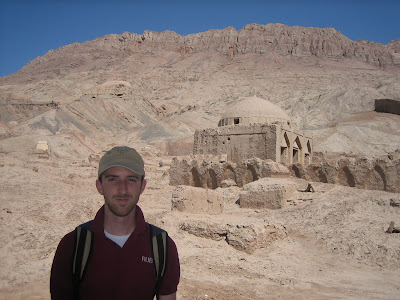
After Tuyoq, we drove by an abandoned city (less impressive than the one we'd pay to visit later in the day); some ancient burial grounds, most of whose remnants have been relocated to museums elsewhere; and incredibly overpriced irrigation systems that are on display for free throughout much of Xinjiang. We also drove by Flaming Mountain, which the local authorities have tried to turn into a tourist attraction by fencing in a few acres in front of the mountain and filling them in with statues and amusement rides, despite the fact that the mountain can be seen for countless miles around. As I've noted before, this is one of the maddening things about China: taking something pure and simple and trying to make it into something more grand, in order to make a buck. Entire old cities can be razed with the hope of producing a picture-perfect village that tourists might want to visit, even if the new product contains nothing true. At the Great Wall section of Badaling near Beijing, the same thing is true, as if the Wall itself if is not enough reason to visit. And, it would be true a few days later when I decided to visit Tianchi.
On the road again:
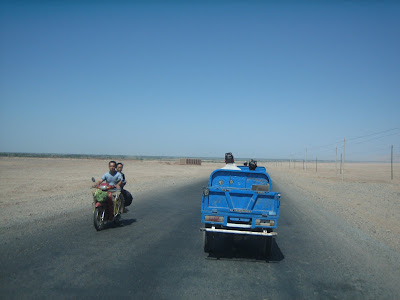
Flaming Mountain:
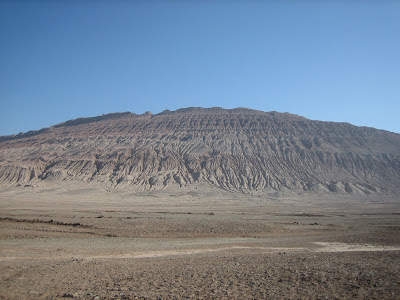
After a delicious lunch in Turpan, we departed for the other side of the city, to walk around the ancient city of Jiaohe, which was once an important stop along the Silk Route. It's unfortunate that I can't post pictures now, though I promise to do so in a week or so, because this place really was one of the top five things I have seen in China, and the government hasn't done too much to spoil it, other than the ubiquitous security cameras to make sure you don't wanted off the paths and contribute further to the erosion of the city. Street plans and walls of up to about 20 feet are still evident in some places, and even back then it likely would have taken an hour to traverse across the city. Exhausted from the day's sights, I collapsed back at the hostel for a nap before eating dinner and retiring for bed.
Jiaohe:
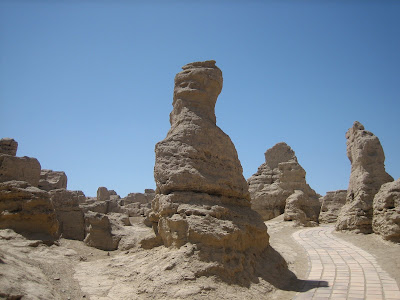

The following day, I took the bus back to Urumqi and met Tyler's friend, Akbar, in time for lunch and dinner. A Uighur-version of friends back home, he's been cracking jokes since I met him and has made my stay in Urumqi much more enjoyable. He's also been a valuable lens on the Uighur situation in Xinjiang. Like many other minority areas in China, the government has adopted the practice of aggressively encouraging Han majority people to rapidly populate minority areas, thus suffocating minority presence and culture and simultaneously minimizing the possibility of minority protests/movements against the majority. Minority peoples then experience trouble in getting a job, as they are either discriminated against or lack the Mandarin language faculties necessary to gain proper employment, and thus starts the cycle of generational poverty. Even in heavily Uighyr areas of Xinjiang, I noticed countless youths and people of working age just sitting on the streets with little to do. Despite this, Akbar does seem optimistic about the future when I asked him about it. He is a college professor, though, so perhaps this is not the most accurate reflection of current Uighur thought.
Akbar about to destroy a watermelon. Actually, the traditional Uighyr way of eating the watermelon is to cut it only into quarters and then eat it with a spoon (as opposed to our thinner, messier slices):

The next morning (I lost track of days and dates a long time ago) I took a few city buses to the entrance of People's Park, hacked my way through tour touts, and eventually found my way upon simple buses to and from Tianchi, also known as Heavenly Lake. I had looked forward to the trip for days, as it would be a welcome alternative to the arid climate of Turpan, being described by some as China's version of Switzerland. I planned to stay the night in a Kazakh yurt (tent) along the lake and under the shadows of the 20000ft mountains, but I did not anticipate the commercial adulteration I would encounter at the site. A giant, loud, outdoor big-screen television and amusement rides greeted me at the entrance to the valley after I had paid the ridiculous entrance fee, and from there I had the option of walking up the mountain or paying another ridiculous fee to take a cable car or bus to the top of the viewing area. I chose to take the one or two thousand steps to the top, and apart from the Chinese field trip groups, the scenery was left fairly untouched. When I reached the top, however, where I could be joined by those less outdoors-inclined, I felt like I was in at Disney World. Loud music was blasting from numerous speakers, ugly boat ramps had been installed to make a few extra bucks from tourists, and no one really seemed to care that they were in a place that should have been revered for its beauty. Now, my experience with Chinese outdoor/nature experiences has been that the picture is worth more than one's actual experience in nature, and this occasion be the model for such an assertion. I was pretty disgusted and decided not to stay the night and instead hike down as quickly as possible and spend the night back in Urumqi. This meant that I had to find other transportation back, since I had told my bus that I would not be returning that day and they had found someone else to take my seat, so after about fours hours on mostly dirt roads, and a thick layer of dust on my belongings and in my mouth, I made it back to Urumqi. After another hour getting lost on city buses, I made it back to Akbar's apartment, waited a few hours for him to get home, and then crashed in bed.
Giant, loud TV at Tianchi:
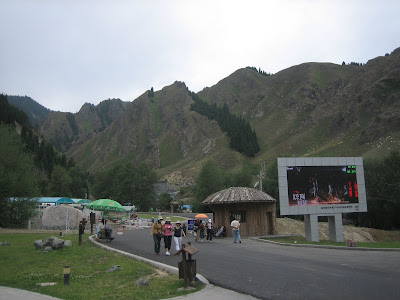
Solar radio in the middle of nowhere, Tianchi:
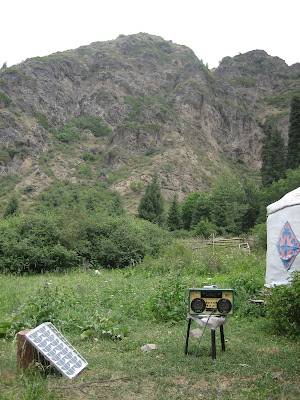
Tianchi (I've covered up the ugliness with the rocks in the foreground):
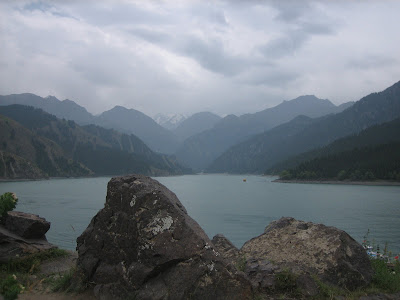
Traditional Kazakh yurts:
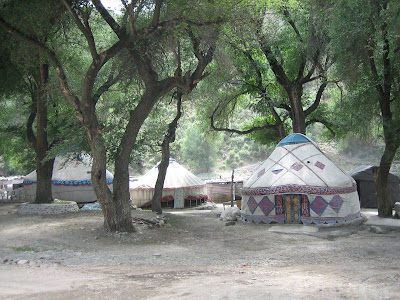
This morning I spent a few hours trying to arrange flights for the end of my trip (again, transportation here: sucks), before doing some shopping at the enormous, and impressive, International Bazaar, which bodes well for some of you. Tomorrow I head to Beijing for a meeting and some shopping, before heading BACK down to Hong Kong for a couple of meetings, and then back up to the Shanghai area and Weihai for the final two weeks with people I actually know. You can't imagine how great that will be after almost three weeks by myself.
International Bazaar:

About a week ago, I flew from Chengdu to Urumqi, capital of Xinjiang Autonomous Region in China. Xinjiang and Sichuan, where Chengdu is located, were two of the places I most wanted to visit in 2006-2007, but I ran out of time and money. Luckily, all of my other plans fell through and flights to both were cheap this summer, so I suppose I now need to come up with some additional places worth exploring. Tibet would certainly make this list, but it's massively expensive with all of the rules and regulations of the Chinese government. Anyhow, I arrived in Urumqi, not known for much beyond being a transportation hub, and shared a cab with the Swiss Germans to the hostel, since all of my potential couchsurfing guests had fallen through, where I promptly met another Swiss German, with whom I went out for dinner and a beer. Xinjiang is an interesting place for a number of reasons, the least of which is its absurd time zone classification. The Chinese central government operates the entire country under one time zone, so in the West, which is more than 3000 miles from and closer to Kazakhstan and Pakistan than Beijing, the sun effectively rises at around 8:30am and sets around 9:30 or 10:00pm. Of course, the locals operate on their own time, two hours behind that of Beijing, but that just means that you always have to stipulate which time zone you're referring to--Beijing time or Xinjiang time. It gets pretty confusing if you're not paying attention, and it makes you second guess yourself whenever you set a time for something.
Returning from the tangent now, I decided to leave Urumqi after only one night for Turpan, because Turpan has a number of compelling reasons to visit, and because I didn't want to save that visit for later in the week, get trapped without transportation, and not be able to make it back for my return flight from Urumqi. So, the next day I took a bus to Turpan, which was regularly over 110 F during the day, and latched on to the first foreigners I saw, since I wanted to hire and share a car for the next day to visit some sights, and because I didn't want to be stuck eating dinner alone, since not too many foreigners make it this far north and west. My communication has been limited, especially in the heavily Uighur areas like Turpan, so chatting with the locals was less of an option. In this case, the Belgians and Frenchies were the lucky ones, and I made a decent effort in the Yahtzee that they had continued from their 24-hour train rides from the day before. The actual city of Turpan has little to do beyond its bazaar, which was more impressive for the people watching than for what was offered, so I rode a donkey cart into town to search unsuccessfully for a karaoke joint with the Brits and Frat Boys, before heading to bed.
Wind farms in the desert:

Common mode of transportation:

Mosque in the old part of town:

Another mosque:

These guys had a little accident when they took their eyes off the road to stare at the foreigners walking through town:

Donkey and Uighyrs:

Emin Minaret in Turpan:

Our mode of transportation to look for a karaoke joint in Turpan (the structure behind the donkey is used for drying grapes):

My hotel (my dorm room was in the basement) in Turpan:

Watermelon alley at the bazaar:

Our car departed the next morning at 7:30am, and we were luck to arrange with the driver which areas we wanted to visit. We intended to avoid what had been described as tourist traps by many guides and other travelers, but dedicate extra time to those places that really had something to offer. First on the itinerary was the village of Tuyoq, set in a valley beneath caves dating from 400 AD. This place was incredible, really an oasis in the hot desert; the cemetery on the edge of town that was at least 1000 years old was especially interesting. It is said that this is considered seen visits to Tuyoq equal one visit to Mecca, as this is the resting place of one of the Uighur forefathers, and also perhaps because virtually none of the Uighurs has the resources to make it to Mecca. We did have to argue for 20 minutes before we allowed to depart, though, since we decided to eat the ice cream that had been offered to us, despite our Strong resistance, rather than let it melt. Unfortunately, as the government has limited travel in the region and to the country as a whole this summer because of the Olympics, the town has seen an enormous drop in tourism, but the few people I chatted with did seem optimistic that order would return in time for next summer.
Tuyoq:



Watching over the melons:

Skinning a newly-killed goat:

Chillin'-out, maxin', and relaxin' all cool:

Damn it feels good to be a gangster. I know I look like a tool, but I thought some protection from the desert sun would be wise:

After Tuyoq, we drove by an abandoned city (less impressive than the one we'd pay to visit later in the day); some ancient burial grounds, most of whose remnants have been relocated to museums elsewhere; and incredibly overpriced irrigation systems that are on display for free throughout much of Xinjiang. We also drove by Flaming Mountain, which the local authorities have tried to turn into a tourist attraction by fencing in a few acres in front of the mountain and filling them in with statues and amusement rides, despite the fact that the mountain can be seen for countless miles around. As I've noted before, this is one of the maddening things about China: taking something pure and simple and trying to make it into something more grand, in order to make a buck. Entire old cities can be razed with the hope of producing a picture-perfect village that tourists might want to visit, even if the new product contains nothing true. At the Great Wall section of Badaling near Beijing, the same thing is true, as if the Wall itself if is not enough reason to visit. And, it would be true a few days later when I decided to visit Tianchi.
On the road again:

Flaming Mountain:

After a delicious lunch in Turpan, we departed for the other side of the city, to walk around the ancient city of Jiaohe, which was once an important stop along the Silk Route. It's unfortunate that I can't post pictures now, though I promise to do so in a week or so, because this place really was one of the top five things I have seen in China, and the government hasn't done too much to spoil it, other than the ubiquitous security cameras to make sure you don't wanted off the paths and contribute further to the erosion of the city. Street plans and walls of up to about 20 feet are still evident in some places, and even back then it likely would have taken an hour to traverse across the city. Exhausted from the day's sights, I collapsed back at the hostel for a nap before eating dinner and retiring for bed.
Jiaohe:


The following day, I took the bus back to Urumqi and met Tyler's friend, Akbar, in time for lunch and dinner. A Uighur-version of friends back home, he's been cracking jokes since I met him and has made my stay in Urumqi much more enjoyable. He's also been a valuable lens on the Uighur situation in Xinjiang. Like many other minority areas in China, the government has adopted the practice of aggressively encouraging Han majority people to rapidly populate minority areas, thus suffocating minority presence and culture and simultaneously minimizing the possibility of minority protests/movements against the majority. Minority peoples then experience trouble in getting a job, as they are either discriminated against or lack the Mandarin language faculties necessary to gain proper employment, and thus starts the cycle of generational poverty. Even in heavily Uighyr areas of Xinjiang, I noticed countless youths and people of working age just sitting on the streets with little to do. Despite this, Akbar does seem optimistic about the future when I asked him about it. He is a college professor, though, so perhaps this is not the most accurate reflection of current Uighur thought.
Akbar about to destroy a watermelon. Actually, the traditional Uighyr way of eating the watermelon is to cut it only into quarters and then eat it with a spoon (as opposed to our thinner, messier slices):

The next morning (I lost track of days and dates a long time ago) I took a few city buses to the entrance of People's Park, hacked my way through tour touts, and eventually found my way upon simple buses to and from Tianchi, also known as Heavenly Lake. I had looked forward to the trip for days, as it would be a welcome alternative to the arid climate of Turpan, being described by some as China's version of Switzerland. I planned to stay the night in a Kazakh yurt (tent) along the lake and under the shadows of the 20000ft mountains, but I did not anticipate the commercial adulteration I would encounter at the site. A giant, loud, outdoor big-screen television and amusement rides greeted me at the entrance to the valley after I had paid the ridiculous entrance fee, and from there I had the option of walking up the mountain or paying another ridiculous fee to take a cable car or bus to the top of the viewing area. I chose to take the one or two thousand steps to the top, and apart from the Chinese field trip groups, the scenery was left fairly untouched. When I reached the top, however, where I could be joined by those less outdoors-inclined, I felt like I was in at Disney World. Loud music was blasting from numerous speakers, ugly boat ramps had been installed to make a few extra bucks from tourists, and no one really seemed to care that they were in a place that should have been revered for its beauty. Now, my experience with Chinese outdoor/nature experiences has been that the picture is worth more than one's actual experience in nature, and this occasion be the model for such an assertion. I was pretty disgusted and decided not to stay the night and instead hike down as quickly as possible and spend the night back in Urumqi. This meant that I had to find other transportation back, since I had told my bus that I would not be returning that day and they had found someone else to take my seat, so after about fours hours on mostly dirt roads, and a thick layer of dust on my belongings and in my mouth, I made it back to Urumqi. After another hour getting lost on city buses, I made it back to Akbar's apartment, waited a few hours for him to get home, and then crashed in bed.
Giant, loud TV at Tianchi:

Solar radio in the middle of nowhere, Tianchi:

Tianchi (I've covered up the ugliness with the rocks in the foreground):

Traditional Kazakh yurts:

This morning I spent a few hours trying to arrange flights for the end of my trip (again, transportation here: sucks), before doing some shopping at the enormous, and impressive, International Bazaar, which bodes well for some of you. Tomorrow I head to Beijing for a meeting and some shopping, before heading BACK down to Hong Kong for a couple of meetings, and then back up to the Shanghai area and Weihai for the final two weeks with people I actually know. You can't imagine how great that will be after almost three weeks by myself.
International Bazaar:


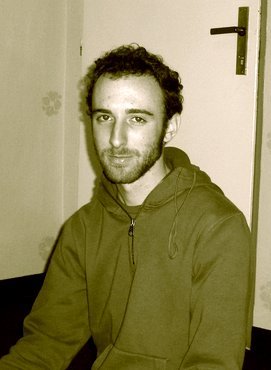

1 Comments:
I always wondered how they did the time zone thing. Do they actually have TWO SETS of clocks? How do you know which is which?
Post a Comment
<< Home